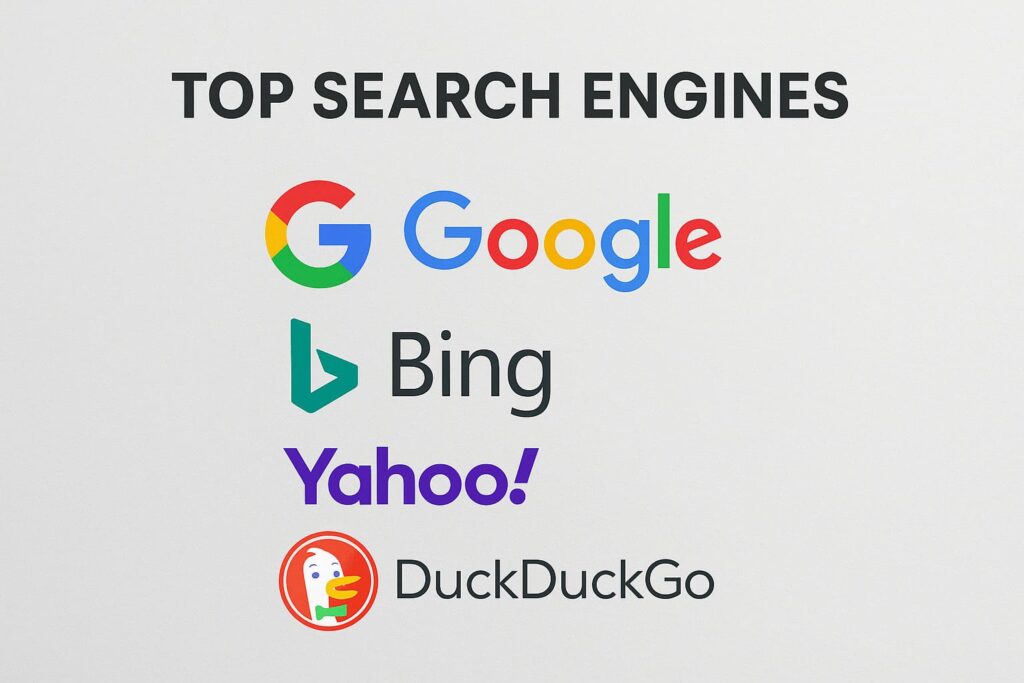Every time you type a question, product, or idea into a search bar, you’re relying on a search engine to bring back answers. For most of us, that search engine is Google. But Google isn’t the only player in town. Millions of people use alternatives like Bing, Yahoo, Baidu, and DuckDuckGo every single day.
While Google dominates the global market, the other engines still hold large chunks of users — some because of regional preferences, others because of features like privacy or eco-friendly values. For businesses and marketers, that means opportunities. Optimizing only for Google can leave potential audiences untapped.
This guide looks at the top search engines in the world, their strengths, their user bases, and why each one matters in today’s digital space.
Why Search Engines Matter
Search engines decide how people find information, products, and services online. If your site isn’t visible where people search, it won’t matter how good your product is. That’s why search engines are one of the main ways websites get traffic, leads, and customers.
Different engines attract different users. Google is huge, but Bing, Baidu, Yandex, DuckDuckGo, and others each have their own audiences and strengths. For example, Baidu is the go-to in China, Yandex has strong reach in Russia, and DuckDuckGo appeals to privacy-focused users. That means the same SEO approach won’t work everywhere.
Search intent also changes by engine and feature. Some engines surface shopping results, maps, or news more prominently. If a search leads to a local pack or shopping carousel, that affects whether a user clicks, converts, or just reads the answer on the page. Understanding which features show up helps you shape content that matches what users actually want.
Finally, thinking beyond Google opens new opportunities. You can capture niche audiences, win less-competitive spots, and use different ad or traffic channels. Track performance separately for each engine and tailor content and technical setup to match—language, hosting, or schema needs can differ by engine.
Top Search Engines in the World (with market share highlights)
1. Google
Google is the world’s most popular search engine, handling over 90% of global searches. Its success comes from a strong algorithm, speed, and constant updates that improve how results match user intent.
Google offers a wide range of features like featured snippets, knowledge panels, local packs, image results, shopping carousels, and video sections. These make it more than just a list of blue links—it’s now a full ecosystem where users can get answers without leaving the page.
For businesses and website owners, ranking on Google is often the top priority. Optimizing for Google means focusing on high-quality content, fast-loading pages, mobile friendliness, structured data, and strong backlinks. Since competition is tough, standing out requires consistent SEO efforts and attention to Google’s latest updates.
2. Bing: Microsoft’s Search Engine
Bing is the second-largest search engine worldwide and powers search on platforms like Yahoo and Microsoft Edge. While its market share is much smaller than Google’s, it still attracts millions of daily users, especially in the United States.
One of Bing’s strengths is its integration with Microsoft products, including Windows, Cortana, and Office. It also fuels search on voice assistants and the Xbox platform. For advertisers, Bing Ads (now Microsoft Advertising) can often provide cheaper clicks compared to Google Ads.
From a user experience point of view, Bing highlights rich images, video previews, and detailed local results. Its homepage is famous for daily background photos that make the interface visually engaging.
For SEO, ranking on Bing requires slightly different tactics. Bing favors exact-match keywords, older domains with strong history, and websites that use clear metadata. While backlinks matter, Bing puts more weight on on-page optimization and user engagement signals.
3. Baidu: China’s Top Search Engine
Baidu dominates the search market in China, holding a massive share compared to other platforms. Since Google is blocked in the country, Baidu has become the go-to search engine for Chinese users, making it vital for anyone targeting this audience.
Baidu’s interface and features are similar to Google, but it also has strong ties to local Chinese internet habits. It includes search for websites, images, news, videos, maps, and even forums. Baidu is deeply integrated with other Chinese apps and services, which strengthens its reach.
For businesses, Baidu advertising works much like Google Ads, but with stricter government regulations and unique requirements such as hosting content on Chinese servers. SEO on Baidu also demands different practices: simplified Chinese content, faster website speed, and compliance with local laws.
Because of its size and influence, Baidu is not just a search engine but a gatekeeper to China’s massive digital market.
4. Yahoo: Once a Search Pioneer
Yahoo was one of the earliest internet giants and for a long time dominated the search engine market. In its early years, many users treated Yahoo as the gateway to the web, thanks to its search, email, news, and directory services all bundled together.
Today, Yahoo no longer runs its own independent search engine. Instead, it relies on Microsoft’s Bing to power its search results. Despite this shift, Yahoo still holds a loyal user base, especially for services like Yahoo Mail and Yahoo Finance.
Even though Yahoo is no longer the leader it once was, it still has influence and can send traffic, particularly in the United States and Japan.
5. Yandex: Russia’s Search Leader
Yandex is the most popular search engine in Russia and also has a presence in nearby countries like Belarus, Kazakhstan, and Turkey. While Google is available in these regions, Yandex still holds a strong share because it’s tailored to the Russian language, culture, and online habits.
One of Yandex’s key strengths is its focus on the Russian language and local context. It handles complex grammar and word forms more naturally than Google, which makes it very effective for native speakers. Yandex also offers services beyond search, including maps, email, cloud storage, ride-hailing, and even food delivery, similar to how Google has its ecosystem.
Because of its dominance in its region, Yandex is a must-consider platform for businesses trying to reach Russian-speaking audiences.
6. DuckDuckGo: Privacy-Focused Search Engine
DuckDuckGo is a smaller search engine compared to giants like Google and Bing, but it has built a strong reputation around one promise: privacy. Unlike most search engines, DuckDuckGo does not track users, store personal information, or create targeted ad profiles.
Its search results come from a mix of over 400 sources, including Bing, Wikipedia, and its own web crawler called DuckDuckBot. This allows it to provide reliable results without building massive data profiles on users.
DuckDuckGo is especially popular among privacy-conscious users who want a simple, ad-light search experience. It’s also the default search engine on the Tor browser, which is often used for anonymous browsing.
Even though DuckDuckGo has a much smaller market share, its steady growth shows that privacy-first search is gaining importance.
7. Ask.com: A Question-Answer Style Search Engine
Ask.com, originally known as Ask Jeeves, was built around the idea of answering questions in natural language rather than just matching keywords. In its early days, users could type queries like “What is the tallest mountain in the world?” and get direct answers, which was ahead of its time.
Over the years, Ask.com shifted away from being a full search engine and started relying on partnerships, mostly pulling results from Google. Its main focus today is on Q&A-style content and providing quick answers, much like a knowledge hub.
Ask.com’s history is a reminder of how user intent in search has always mattered, and it paved the way for modern features like featured snippets and AI-generated answers.
8. Ecosia: The Eco-Friendly Search Engine
Ecosia has gained popularity not because of market dominance, but because of its unique mission: using ad revenue to plant trees. Every search made on Ecosia contributes to funding global reforestation projects, which has attracted users who want their online activity to make a positive impact.
Ecosia’s search results are powered by Microsoft’s Bing, so the quality of results is quite reliable. It also places a strong focus on privacy, promising not to sell user data to advertisers.
While Ecosia’s market share is small compared to giants like Google, it’s steadily growing and has built a loyal user base that cares about sustainability.
Conclusion
Search engines may share the same core purpose—helping people find information—but each has its own strengths and audience. Google leads with innovation and global dominance, Bing ties closely with Microsoft products, Baidu rules in China, and Yandex serves Russian speakers best. Meanwhile, engines like DuckDuckGo and Ecosia appeal to people who value privacy or sustainability.
Also read:




